In a move condemned as a stifling of communication rights, the Modi government has wielded internet shutdowns as a potent tool against the people of occupied Kashmir.
Since 2018, there have been a staggering 418 instances of internet and telephone services being disrupted by the Indian authorities.
The turning point came on August 5, 2019, with the abrogation of Article 370. In the aftermath, internet cables and telephone services were not reinstated until February 5, 2020, marking one of the lengthiest communication blackouts globally.
#Modi govt's persistent use of internet shutdowns as a tool of suppression in #Kashmir is alarming.
— SAMAA TV (@SAMAATV) January 31, 2024
This extended internet outage, termed the world's longest, has plunged Kashmir into the 'Stone Age' according to Reuters. #SamaaTV pic.twitter.com/WOv9oyu4Of
According to Reuters, the 18-month-long internet shutdown has pushed Kashmiris into a digital dark age, significantly impacting their daily lives. The report further highlights that the internet blockade in Kashmir is the longest ongoing restriction of its kind worldwide.
A report by the Voice of America on February 11, 2021, revealed that the internet shutdown in Kashmir stands out as the most protracted among global instances of communication blackouts.
Over the past four years, India has consistently topped the charts globally for curbing communication channels, earning notoriety for suppressing freedom of expression and stifling the flow of information.
As of 2022, among the 187 documented instances of internet shutdowns worldwide, 84 occurred in India, with Kashmir accounting for 49 of these cases.
The situation remains a cause for concern, with the international community closely monitoring the prolonged denial of communication rights in the region.


























